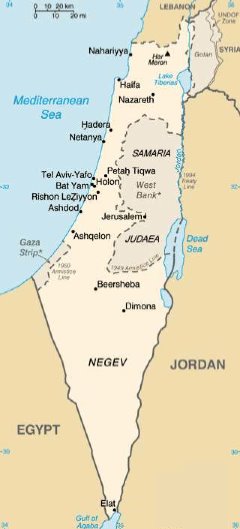The Arab League in Israel?
"Wednesday's visit was the first by Arab League representatives to promote their peace plan," remarked an article in al-Jazeera.
The author was referring to a trip by the Egyptian and Jordanian foreign ministers to the Jewish State, where they met with the Israeli Prime Minister, foreign and defense ministers, and president. The purpose of the trip was to promote the Arab League's Saudi Peace Initiative for a resolution of the Arab-Israeli conflict.
Mark Regev, Israel's foreign ministry spokesman, agreed with al-Jazeera over the nature of the visit: “This is the first time that a delegation is coming here under the auspices of the Arab League.’’
But Amr Moussa, the Secretary General of the Arab League, vigorously denied that the foreign ministers represented his organization: "They are not acting under the banner of the Arab League. They represent two Arab countries that for certain circumstances entered into peace accords and official diplomatic relations."
So what's the fuss about? Why would Moussa offer such a fervent repudiation of any connection between the ministers' mission and the Arab League?
The answer, it seems to me, is that old animosities die hard. Though the League was created in 1945, in 1944 representatives from Egypt, Syria, Jordan, Iraq, and Lebanon gathered to discuss the future institution. The result was the Alexandria Protocol, which spelled out the goals of the Arab League.
One of those goals was to end Jewish immigration into what was then British Mandate Palestine. Later, shortly after the Arab League was finalized, the League passed a resolution that stated, "Jewish products and manufactured goods shall be considered undesirable to the Arab countries" and that all Arab "institutions, organizations, merchants, commission agents and individuals" must "refuse to deal in, distribute, or consume Zionist products or manufactured goods."
Since then--when the leaders of Arab League member states weren't calling for the Jews to be thrown in the sea, or denouncing Israel at the U.N., or supporting groups that kill Israeli civilians--the League has tried to ignore Israel. Pretend it doesn't exist, that it is not part of the region.
But lately there have been forces in the Middle East that can't be ignored: the rise of both al-Qaeda and Iran. Though Saudi Arabia once thought it could contain al-Qaeda, the terrorist organization has perpetrated attacks throughout the Middle East, including within Saudi territory. And Iran--whose Persian, Shi'ite version of Islam is an anathema to most Arab countries--has grown increasingly bellicose.
In order to counter these forces, and ease internal tensions, Saudi Arabia came up with a plan that was approved by the Arab League in 2002 and reaffirmed in 2006. The Saudi Peace Initiative calls for full Arab recognition of Israel in return for 1) Israeli withdrawal from the West Bank, the Gaza Strip, and east Jerusalem; 2) the creation of a Palestinian State; and 3) a just solution to the Palestinian refugee problem in accordance with U.N. Resolution 194 (which the Arab public takes to mean that Palestinians should be allowed to resettle in Israel).
The Arab League expects Israel to carry out its obligations before gaining diplomatic recognition from the Arab states. So even though the League has certified the Initiative and authorized the Jordanian and Egyptian foreign ministers to speak to Israel in order to promote it, the Arab League bristles at any suggestion that it is dealing with the "Zionist regime."
If it truly envisions peace between Israel and its neighbors, the Arab League must end these petty denials. This way, Israel and the international community will know that the League desires a friendly, safe, and prosperous future more than it dwells on past hostilities.



0 comments:
Post a Comment